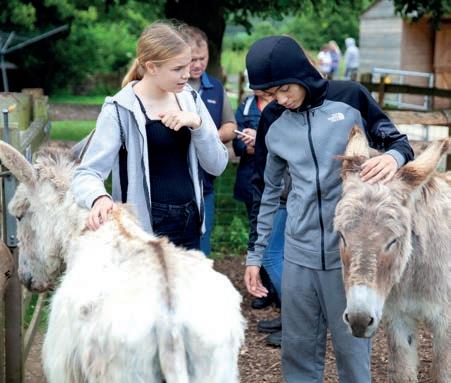
2 minute read
Eff ective engagement
rom my perspective, one of the
Fbest things about working in our London o ce has always been our proximity to Westminster and the ability to go and lobby for our members at a moment’s notice.
We have been able to easily host briefi ng sessions for parliamentarians on any topic and run more detailed campaign events. However, like everyone else, we have had to adapt our ways of working to continue engaging with MPs and peers.
While face-to-face meetings have been di cult, parliamentary work did not stop in 2021, with important pieces of legislation progressing through the House.
The Environment Bill, which has been delayed twice, was fi nally debated in 2021 ahead of COP26 in November. This bill, which will provide lasting environmental targets for the UK and a framework for the upcoming Environment Land Management (ELM) schemes in England, is vital for many members. Therefore, we ensured we continued lobbying on areas of importance for landowners, including water abstraction licences, conservation covenants and the inclusion of heritage as a public good.
Over the year, we held numerous individual meetings with peers and MPs online, and provided written briefi ngs and amendments for every stage of the bill. One of benefi ts of working online has been the ability to bring parliamentarians together to talk about specifi c areas of interest. Previously, trying to fi nd a joint date in the diary might have been an almost impossible task. This has led to successes, especially regarding the inclusion of heritage, with indications that it will be included as a public good after sustained lobbying from CLA-briefed peers.
As well as actively lobbying on current legislation, the CLA team has also been working behind the scenes with government departments on the impact of upcoming legislation on rural areas. The removal of section 21 and the requirements of Minimum Energy E ciency Standards on rural properties will put signifi cant pressure on the private rural let sector. We met frequently with housing ministers, and have proposed ways to avoid unfairly penalising the sector. We look forward to this being re ected in the updated proposals.
In 2021 we worked extensively with our All-Party Parliamentary Group (APPG) for the Rural Powerhouse on an inquiry into rural productivity and how to close the gap with urban areas. Six evidence sessions were held, focusing on the core themes of connectivity, planning, agriculture, skills, taxation and the UK government’s approach to rural policy. These sessions, which were chaired jointly by Lord Cameron and Julian Sturdy MP, produced pragmatic and helpful discussions, with several practical solutions put forward to increase productivity in rural areas. The group was regularly attended by 10 MPs and peers, with evidence from experts in their respective fi elds.
As part of the APPG inquiry, we also received more than 50 pieces of written evidence to the inquiry from rural experts, academics and other stakeholders. A report will be published in early 2022. While we may not have physically visited parliament in 2021, we have worked hard elsewhere, at every opportunity, to push the rural agenda.
dCLA Public Aff airs Manager Eleanor Wood explains how the team has adapted to continue eff ectively engaging with MPs andpeers on legislation aff ecting members s

spa o e G qu received more than 50 piece evidence to the inquiry from experts, academi stakeholders. A be published While we have physic parliament we have hard e at ev o










